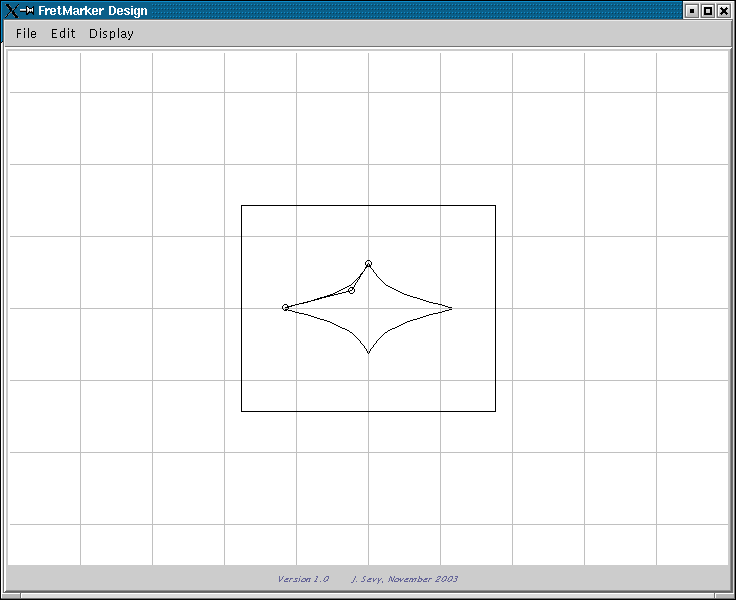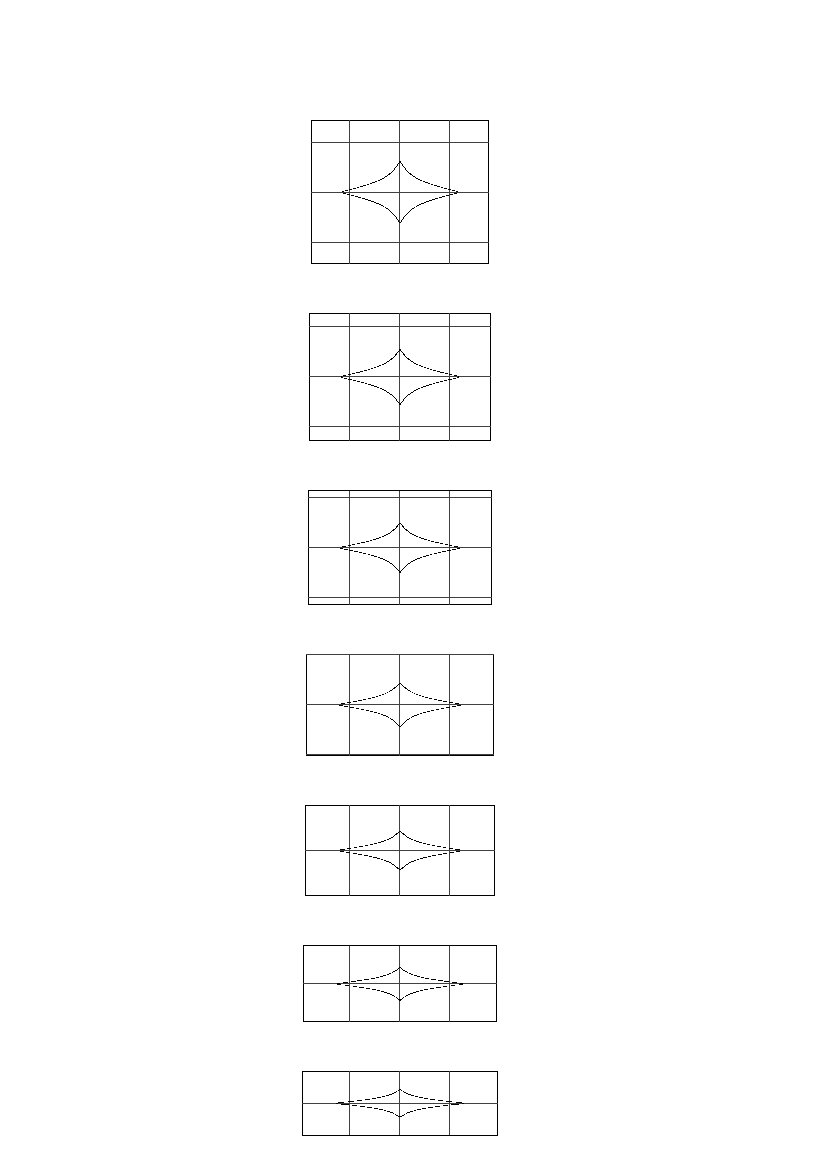Fretmarker Design User Guide
Overview
Fretmarker Design is a Java application to aid in
the design of unique guitar fret markers. Fret marker designs are
specified with control points which indicate
the general shape of the design; as the points are dragged to new
positions, the fretmarker shape changes in the same direction. By
moving (and adding and deleting) control points, a fretmarker design
can be refined until it has the desired shape. A dialog allows the
specification of the parameters of the guitar fretboard, including the
scale length, the fretboard width at the the nut, and the fretboard
width at the 12th fret. These parameters are used when the design is
printed: the design is automatically scaled to produce templates for
each of the frets which traditionally receive a marker (the F, G, A, B,
C#, E, G, A, B, C# and E frets).
 Figure 1: Fretmarker Design screenshot
Figure 1: Fretmarker Design screenshot
Starting
To start Fretmarker Design, either double-click on the FretmarkerDesign.jar file
(Windows or Mac OSX), or type
java -jar FretmarkerDesign.jar
in a command-line window. When the Fretmarker Design application is
opened,
a blank design screen is displayed, with a rectangular outline that is
the size of the space on the fretboard behind the low "F" fret. To
begin a new design, select "New Design" from the "File" menu. The
application will then be waiting for you to place the control points
for the design; the points will be displayed sequentially wherever you
click the mouse. When finished, select "Sketch curve" from the
"Edit" menu. The curve corresponding to the control points will be
drawn, along with the control polygon consisting of line segments
connecting the control points, and the matching portions of the design
if symmetry is selected in the Graphics dialog (discussed below). The
design can now be refined by
dragging the control points; as a point is dragged, the region of the
curve
in the vicinity of the point will change to follow the movement of the
control
point.
Notice that when a control point is clicked on with the mouse, it becomes
highlighted; this is important when adding, deleting and altering the wieght
of points (see below), as the operation will apply relative to the currently
selected point.
Some general design principles
- It takes relatively few control points to create a pleasing design.
- The curve will always pass through the first and last control points.
File Menu
The file menu contains items for opening, saving and printing designs.
New design
Select this to start a new design. After this item is chosen, the application
will be waiting for you to click at the position of each successive control
point, which will be drawn as a circle on the design. When finished placing
control points, select "Sketch curve" from the "Edit" menu; the control-point
addition process will be ended, and the curve and control polygon drawn
on the design.
Open design
Self-explanatory
Save design, Save design as
Self-explanatory; however, it's worth noting that the design parameters
are saved as an XML file. This file is plain text, and can be inspected
with a text editor if desired.
Print design
Select this item to print a design out. This will
produce a complete set of scaled fret designs to be used as templates
for producing the markers, as illustrated below. Note that the control
points and control polygon (see below) are not printed
 Figure 2: Fretmarker printout; note that additional frets on second page not shown
Figure 2: Fretmarker printout; note that additional frets on second page not shown
Edit Menu
The "Edit" menu contains items for displaying and altering the design.
Sketch design
The "Sketch design" item simply causes the design to be drawn onscreen;
this is usually only used to stop the addition of control points and cause
the design to be drawn when "New design" has been selected from the "File"
menu.
Add point
This item is used to add a control point. This is useful for refining
a design; adding a control point gives additional flexibility in specifying
the shape of the design curve (though too many can make it difficult to
create a smooth curve, resulting in unappealing lumps). It's necessary to
select the control point that the newly added point will follow before choosing
the "Add point" menu item:
- Select the control point that the new point is to follow by clicking
on one of the existing control points
- Choose the "Add point" menu item
- Click at the position for the new control point; the new point
will be drawn at this position, and the curve will be altered accordingly
The newly added point can be dragged to refine the curve shape.
Delete point
This item is used to remove a control point. It's necessary to select
the control point to be deleted before choosing the "Delete point" menu
item:
- Select the control point to be deleted by clicking on one of
the existing control points
- Choose the "Delete point" menu item; the selected point will
be deleted, and the curve will be altered accordingly
Alter weight
This item is used to affect the amount of
influence a control point has on the curve. The default weight of a
control point is 1: if its weight is increased to 2, the curve will be
drawn more closely to the point; if the weight is increased to 3, the
curve will pass through the point, and may even forma a cusp (sharp
corner) at the point. It's necessary to select the control point whose
weight is to be altered before
choosing the "Alter weight" menu item:
- Select the control point whose weight is to be altered by clicking
on one of the existing control points
- Choose the "Alter weight" menu item; a dialog will appear in
which you can select the point's weight
- When the dialog is closed, the curve will be redrawn to reflect
the control point's new weight
Display Menu
The Display menu contains items that affect the display of the design
Control points
When checked, control points will be displayed. This will usually be
desired.
Control polygon
When checked, the sequence of control points will be connected with
line segments.
Curve
When checked, the curve will be displayed. This will usually be left
checked.
Show display dialog
This item brings up the display dialog, with the following items:
- Units: allows quantities to be specified in either inches or centimeters
- Grid: selects whether a rectangular grid should be drawn in the
display window
- Grid width: specifies the spacing of the grid
- Design window scale factor: specifies the fraction of actual size
used for the onscreen display
- Symmetry: specifies whether the design should be symmetric
- Horizontal symmetry: make the design symmetric about
the horizontal axis
- Vertical symmetry: make the design symmetric about
the horizontal axis
- Radial symmetry: make the design radially symmetric, i.e., symmetric through the center point
- Fretboard parameters: these are used to produce properly scaled templates when printing
- Fretboard scale length: the length of the strings, from saddle to nut
- Fretboard width (nut): width of the fretboard at the nut
- Fretboard width (12th fret): width of the fretboard at the12th fret
Comments/questions: jsevy@cs.drexel.edu


